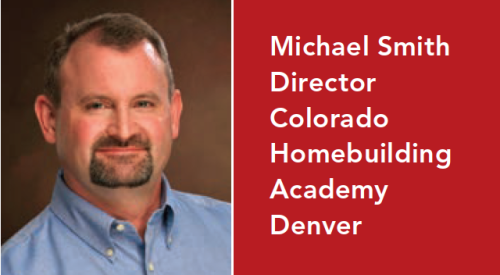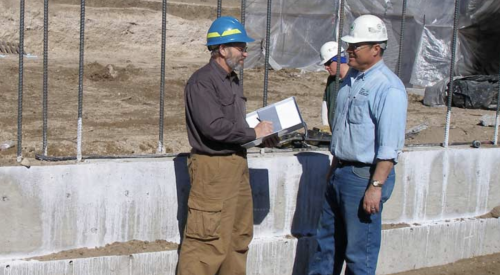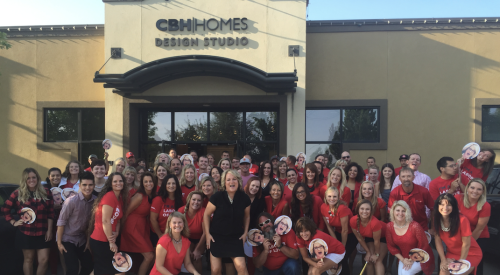|
Do you have great people working for you — people with great skills, a good work ethic, and great working relationships with their fellow employees? If so, kudos — it probably didn't happen by accident. If not, take an inventory of your hiring strategies. In a slowing and competitive market, having a quality staff gives you a definite advantage.
"Most builders look at this business as a land business," says Martin Freedland, president of Organizational Development Associates, a human resources consultancy with several home builder clients, based in Atlanta. "But next door, there's another builder on a comparable piece of land. And if you build a really cool product, within 90 days somebody's going to copy it.
"The thing that will really differentiate one builder from another will be the quality of their people. It gives a builder a strategic advantage to have the best people who are the best trained and who are the happiest. They will just do a better job."
Conversely, a mediocre crop of employees will cost you time and money. Think about it: you place ads, interview and pick someone. You spend time training and getting that person acclimated to the job. Then the problems start: not being dependable, not getting along with other team members, or just doing a bad job. Other employees complain about having to make up for the bad hire's slack. Some quit. Worst of all, your product and service is affected, which affects customer satisfaction and, in the end, your bottom line.
When builders are in a pinch, they can be short-sighted about these consequences.
"You've got a job coming up and you need somebody. You need somebody you don't have to train. You say you'll work out the problems next week if they don't show up," says Ira S. Wolfe, founder of Success Performance Solutions, a Lancaster, Pa.- based company that provides pre-employment evaluations and consulting services. Wolfe taught the class "Construction Management Jump Start and Hiring Competence" at the 2003 International Builders' Show.
"The problem is that the cost of hiring somebody is indirect. Research shows at least half an employee's annual salary and up to 100 percent is spent on a new hire. Even for fast food restaurants that pay seven bucks an hour, the cost to bring somebody on board and provide a minimum of training is $3,000."
It's worth it to spend time and energy on the front end of the hiring process to avoid the consequences of a bad hiring decision later.
Get the Word OutGood hires start with smart recruitment.
"With the market we've had in housing for the last number of years, almost everyone you would want is working," Freedland says, "so they don't respond to ads. If you have a job and you're being paid decently and you haven't been abused, you're probably not going to start searching other builders' Web sites or Monster.com for jobs."
The lesson: don't wait for good candidates to find you. Scout them out.
"It's imperative that the manager, CEO or whoever is doing the hiring actually be out there networking on a regular basis to know where the good people are," Freedland says. "You need a recruiting system that continually has the very best players in your geographical area on your radar screen.
"If you were to lose somebody," Freedland adds, "at best you get two weeks notice, and you can't replace that person with a first-round draft choice in two weeks. If you start scouting around after you get the notice, in most instances you're probably going to end up with a less-than-qualified person for that job."
Internal referrals are another good source. "Take your best people, set up a referral program and hope they refer their friends," Wolfe says.
"We really focus on referrals from existing employees," says Chuck Vassallo, CFO of Atlantic Builders in Fredericksburg, Va. "They know what Atlantic Builders is about, and they are better able to relate to the type of individual we're looking for."
Recruiting good people from other industries can be effective. Jeff Rutt, president of Keystone Custom Homes in Willow Street, Pa., used his experience buying his wife a piece of jewelry to seek out a prospective employee. "This gal was doing a phenomenal job. I kept her card and called her a couple of times over the past six months. Finally she said, 'Yeah, I'm ready to come in and talk.' We really want to keep our eyes open and always be aware of other people that could be interested in working for our company."
Building good relationships with colleges and trade schools can be another pipeline for good talent. Tom Schoedel, president of Atlantic Builders, says the company has looked to Virginia Tech because of its reputable construction management program. Interns were hired through a campus career fair — solid candidates for future careers in the construction industry.
Larger builders and industry associations are making colleges more aware of the opportunities in the home-building industry. If a college in your market has a construction, engineering or related program, keep a presence on campus and use resources to educate faculty about opportunities in the industry and your company (for more on this subject, see sidebar "Recruiting the class of 2007).
Know Who and What You WantKnowing what kind of person your company needs is key. Not only do they have to be able to do the job and fulfill what's outlined in a job description, but they should also fit the company's culture — and that includes working compatibility with the manager.
"A lot of people can do things," Freedland says, "but maybe they don't fit on the team. The greatest rebounder in basketball is Dennis Rodman, but he doesn't have a job. He has trouble playing on teams. But when he played for the Chicago Bulls with [Michael] Jordan, he won a bunch of championship rings. Change the team, change the coach, change the chemistry, and all of a sudden he's ineffective."
Also, certain personality types are a better fit for certain jobs.
"We're looking to match the personality with the position," says Schoedel of Atlantic Builders. "I come from a financial background, but you wouldn't want the accountant personality — that detail- oriented, very task-oriented personality — in the sales role where ego, drive and that desire to make a deal is more important. And you wouldn't want the sales personality in the accountant role. They'd go crazy."
Disposition and attitude are incredibly important.
"Employers should look at team/culture fit, even before the job skills," Wolfe says.
"You find that if people are motivated to learn, they fit well on the team and seem to be motivated by the culture; you can train them to do almost anything.
"People tend to hire on skills and fire on attitude," Wolfe adds. "You almost have to flip it around. All the failures that we hear about are people who have years of experience and training but didn't make it."
"Absolutely attitude comes first," says Schoedel. "A great example is Mr. Vassallo, our CFO. He didn't come from the construction industry. He came from telecommunications. His enthusiasm, his desire, his intensity and his strategic planning brought him to us."
 The biggest mistake managers who hire make is to select an employee solely on gut feeling. The problem comes in identifying whether a person is putting a good face on or talking a better game than they can actually play. |
The biggest mistake managers who hire make is to select an employee solely on gut feeling. This is not to say instinct shouldn't play a role in the decision. Wolfe says the problem comes in identifying whether a person is putting a good face on or talking a better game than they can actually play.
"Managers don't generally spend a lot of time learning to interview better, but candidates do," Wolfe says.
In an era of downsizing and at a time when people often change careers, many job seekers have been coached on interview and presentation skills. And candidates will generally do whatever it takes to avoid rejection.
"Even if they don't want to work for the company, they at least want to get the job offer," Freedland says. "Whether it's your high school prom or a job, people will avoid rejection."
Behavioral interviews and tests are a way to get a more objective assessment of what a candidate is really like.
Interviewers turn to several psychometric tests such as the DISC Profile Personality Test, Myers-Briggs personality type indicator, BERKE and Caliper, to name a few. Wolfe has trademarked an employee selection and performance management system called CriteriaOne.
Good testing instruments can be helpful in predicting behavior on the job and whether an individual will work well with the team.
"When we started looking at CFOs," says Schoedel, "we took my Caliper profile and we asked them, 'What would be a matching caliper to augment my deficiencies and short comings?' That's why we have a very personable and outgoing CFO."
Just don't make a hire based solely on test scores.
"It's an interview tool," says Freedland. "It will help you learn a lot more about them. But would you go to eHarmony and because they recommended you to somebody, meet them at the altar? There has to be face to face interaction, reference checking — a highly disciplined system is needed to make the right decision."
Have Multiple RoundsThe objective of a good interview is to get the candidates to be as honest as possible about who they are, so the hiring manager can answer the questions of competency, attitude and cultural fit.
"One theory is that the candidates should talk to a lot of people," Freedland says. "We don't subscribe to that. If you're going to work for someone, you really want to spend time with that person. The intimacy is so much higher."
Freedland also suggests conducting three- to five-hour interviews.
"This is after screening, reference checking and some sort of written third-party evaluation," Freedland says. "A whole lot of groundwork has been done before you invest this amount of time."
Why such a long meeting? Freedland says it takes about three hours to "get people's energy level down enough that they'll quit spinning things and tell you the truth."
"It's very friendly, very welcoming," Freedland says. "You're not beating them up with rubber hoses. It's just, 'Tell me more about yourself. I'd like to learn more of what happened here. Explain that to me.' The manager learns a lot.
"And at some point you'll get a candidate that will say, 'Well, I probably shouldn't tell you this, but ...' Now some of the warts start to come out. And they are important to know because there aren't any perfect candidates."
Get a TestimonyBefore making a final decision, you have to find reliable references.
"You've got to be able to get past these people who say, 'I'm sorry, we're not allowed to say anything,'" Freedland says.
"The last thing you want to do is talk to an HR department a thousand miles away at some corporate headquarters," he adds. "They have no idea how good or not so good this person is. The person you really want to talk to is the manager right over that person."
Freedland recommends talking with a coworker and even tapping a third party to do the reference check. "For some reason," he says, "people seem to think if they tell it to a third party, it must be okay."
"I ask them to provide personal references," says Vassallo. "Sometimes I'll ask them Caliper questions about the person. You can get a very good feel for or an additional validation of what you think about that person."
And if the candidate has worked in the industry, there's an informal network of references.
"If it's a superintendent, you can talk to trades," Freedland says. "If it's a sales person, talk to the realtors and loan originators. There's such a network of people that will be able to help you get to know this person. But you're going to have to spend some time and energy doing it."
|











